
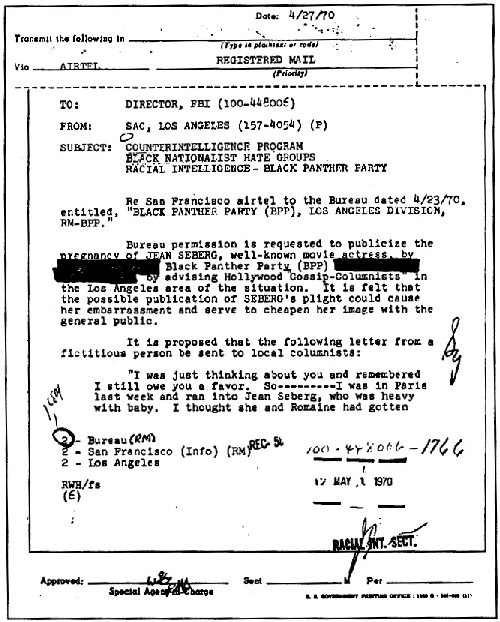
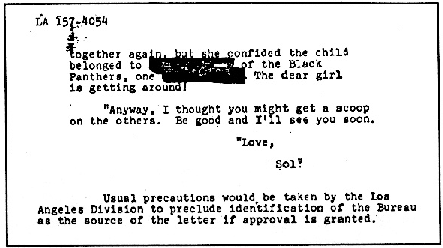



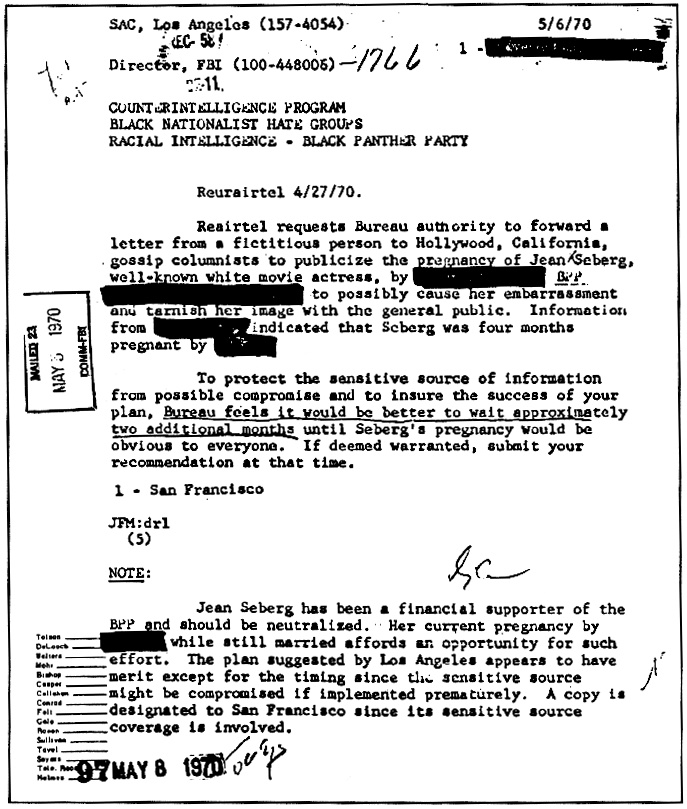
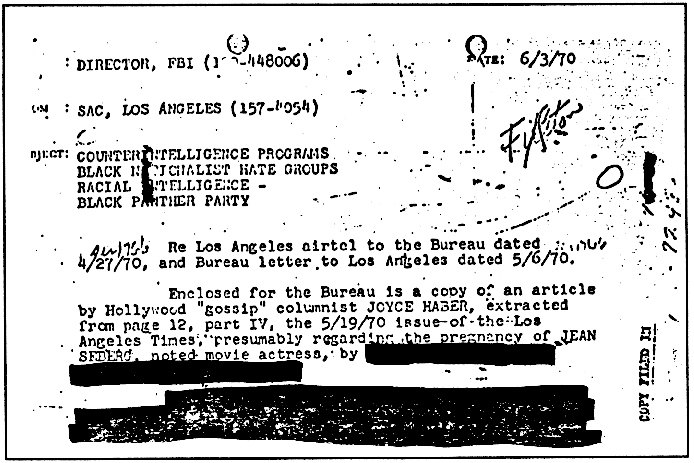
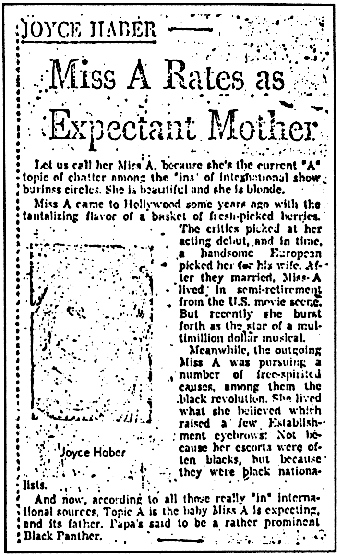
Jean Seberg was one of a group of several prominent celebrities, among them John Lennon, Jane Fonda and Vanessa Redgrave, who, in exercising their democratic birthright to free speech found themselves incurring the wrath of the United States authorities. Seberg, vocal in her support of the Black Panther Party, who fought racial prejudice in the wake of the assassination of Martin Luther King, was singled out for particular attention from notorious FBI director J. Edgar Hoover, who considered her to be a threat to the American apple pie way of life and everything. Seberg, being a movie star and hence presumably wielding some supreme executive influence over western cultural values, was deemed so sufficiant a danger to national security (whatever that means), that on 23rd April 1970, Hoover issued orders that she be "neutralised" under the FBI's aptly named Counter Intelligence Programme (COINTELPRO).
In response to this order, the above request was made to Hoover by FBI SAC Richard W. Held on 27th April 1970. Hoover granted permission for Held to plant the story in the Los Angeles Times, from where it was syndicated across the US. Many believe the subsequent backlash of the right-wing press so traumatised Jean Seberg, who was seven months pregnant at the time, that it significantly contributed to her miscarriage in May 1970. Although at the time Seberg gave as good as she got, totally humilating the rumour mongers when she presented the press with the body of her dead white child, no one could be in any doubt that the episode took a toll on her emotional well being. Eventually Jean Seberg paid with her life, and the world paid with her loss.
The
above documents, made public in 1982, together with the testimony
of her friends, and ultimately the actions of Seberg herself at
that fateful press conference, provide a wealth of damaging
evidence against the FBI's counter intelligence operation, as
well as providing further proof, as if any were needed, that
western civilisation is only "free" as long as the
powers that be say so. The name which was deleted from the above
memo, during an investigation by the FBI's office of Internal
Affairs, is thought by many to have been Raymond Hewit, a Black
Panther leader. The FBI had also typed up a letter on official
FBI stationary identifying Hewit as an informant and planted it
where other Black Panthers would find it, in the hopes that Hewit
would then be killed.
Richard W. Held, the architect of this outrageous bastardisation
of the word "democracy" was, of course, only obeying
orders.
Held later became SAC in San Francisco, and was also incriminated in the bombing of the Earth First activist Judith Bari, by Ward Churchill and James Vander Wall, authors of "The Cointel Papers", from which the above memo was sourced. He subsequently retired from the FBI to become Head of Security for Visa International.
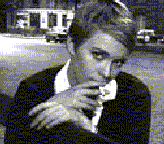
FRIENDS OF JEAN SEBERG ON THE STAR'S PERSECUTION BY THE FBI
"Jean
knew her phone was tapped. Everyone's phone was tapped. Once she
was walking down Sunset Strip, and a fan asked her for an
autograph. It got back to Jean that this girl was busted and
searched by the Feds less than ten minutes later, they wanted to
know what Jean Seberg had given her. Jean didn't scare easily,
but once, in New York, she called to say that someone had been in
her hotel room while she'd been out. She had put Scotch tape on
the closet doors, and it was ripped when she came in. She was a
little paranoid, but with good reason. It was very real. They
were out to get her."
-David Keller, friend
"Jean
was very beautiful and very intelligent, but she had a sad life.
She was a close friend. She pointed out the FBI men who were
constantly following her around. Have you ever seen FBI men? They
were exactly what you expect. Vulgar. Can you imagine such a
thing? What tragedy... I cannot be bothered to tell people
everything that is true, because it is more frightening than
anything they themselves know. You can't tell the truth when
nobody will believe it."
-Nico, friend and co-star of "Les Hautes Solitudes"
FBI STATEMENT PRINTED IN THE LOS ANGELES TIMES FOLLOWING THE NEWS OF JEAN SEBERG'S SUICIDE IN PARIS, SEPTEMBER 1979
"The
days when the FBI used derogatory information to combat advocates
of unpopular causes have long since passed. We are out of that
business forever."

J. Edgar Hoover, pictured in 1970, around the time of Jean
Seberg's miscarriage
WAS JEAN SEBERG ASSASSINATED?
Most sources close to Jean believe that she took her own life. She had suffered deblitating bouts of depression for some nine years by that point. Rumour mongers and conspiracy theorists may still like to suggest otherwise, but in truth Jean Seberg's suicide was sadly not unexpected by those who knew what she had been through. She had seemed quite determined to do it. Although there was some talk of her return to acting at the time of her death, this is by no means any more than speculation. She had turned down offers of roles from both Truffaut and Donald Cammell in the months preceding her death, although she was apparently enthusiastic about a possible but then unconfirmed role that would have reunited her with her "Bonjour Tristesse" co-star David Niven. The film, "A Nightingale Sang in Berkeley Square", was made in 1980, with Elke Sommer assuming the role that Jean had been set to play. It was to be David Niven's last movie.
"Jean
Seberg died by her own hand. I've never thought otherwise. Others
certainly contributed to her breakdown, but by the time it
happened the Jean we knew and loved was already gone. I miss her
terribly, but she made up her own mind in the end. She was the
most willfull girl. She turned her determination against herself,
and against those that thought they could help her. No one could
help her in the end. The rest is academic."
-David Keller